Bogota, Colombia – On January 10, Venezuelan President Nicolás Maduro is set to be sworn in for a third term, after a contested election rife with accusations of fraud and repression.
But as Venezuela prepares for the controversial inauguration, Maduro has repeatedly spent time on state media addressing an old adversary: former United States President Donald Trump.
Trump is set to be sworn in for a second term on January 20, just days after Maduro.
The two men frequently traded insults during Trump’s first term, from 2017 to 2021. But after Trump’s recent re-election in November, Maduro struck a surprising tone.
He publicly congratulated Trump and called the Republican’s second term a “new start”. He also invited Trump to foster a relationship steeped in “respect, common sense dialogue, and understanding”.
Experts say those comments suggest the two strongmen-style leaders may forge a different bond this time around.
That could be particularly critical for Maduro, who faces mounting pressure after his disputed election, including from the US.
Advertisement
“It seems that Maduro is leaving the door open for a more pragmatic approach from the Trump administration,” said Laura Dib, a Venezuela expert at the Washington Office on Latin America, a US-based research and advocacy organisation.

‘Maximum pressure’ campaign
It remains unclear, however, how Trump will proceed when it comes to Venezuela.
During his first term in office, Trump pursued a strategy of “maximum pressure” against Maduro, in an apparent effort to oust the socialist leader.
Trump, a right-wing leader, had taken an adversarial approach to socialist and communist countries like China and Cuba, even rolling back efforts to normalise relations with the latter.
But a growing humanitarian crisis in Venezuela — and continuing allegations of government repression — paved the way for Trump to go further than previous administrations in his efforts against Maduro.
He ramped up sanctions against Venezuela’s beleaguered oil sector, froze the assets of Maduro’s inner circle and even issued a reward of up to $15m for information that could lead to the Venezuelan president’s arrest.
In addition, when Maduro faced an earlier contested election in 2018, Trump recognised a rival claim to the presidency from then-opposition leader Juan Guaido.
“Maduro is an illegitimate ruler, a tyrant who brutalizes his people,” Trump said in his 2020 State of the Union speech, while offering plaudits to Guaido. “But Maduro’s grip on tyranny will be smashed and broken.”

‘Something needs to be done differently’
At first glance, Trump’s pick for secretary of state, Senator Marco Rubio, may signal a return to this hardline approach.
Advertisement
Rubio, part of whose family fled Cuba as refugees, has long been a critic of the governments in Cuba, Nicaragua and Venezuela. He previously advocated for tougher sanctions.
But analysts doubt that Trump will endorse the same “maximum pressure” strategy that failed to dislodge Maduro and contributed to a record outflow of Venezuelan migrants and refugees.
Some critics blame Trump’s oil sanctions against Venezuela for exacerbating its economic crisis, which helped prompt the exodus. The United Nations now estimates that more than 7.77 million Venezuelans have fled their country’s borders.
The number of Venezuelans entering the US without authorisation has also shot upwards, increasing by nearly 17 percent each year from 2018 to 2022. The US-based population is estimated to total about 320,000 people.
Trump, meanwhile, has made stopping the “migrant invasion” into the US a central goal of his second term.
“I don’t think the Trump administration can assume power and try to do exactly the same thing it did in 2019 and 2020,” said Benigno Alarcón, the director of the political studies centre at Andrés Bello Catholic University in Caracas, Venezuela. “Something needs to be done differently.”
With Venezuelans among the top nationalities crossing the US-Mexico border irregularly, Trump’s policies towards Maduro will likely be influenced by his interest in curbing migration.
“ The focus on Venezuela seems to be through the lens of migration,” Dib said of Trump’s second term.

Tackling Venezuelan migration
The question remains whether Trump will work with Maduro to achieve his objectives.
Advertisement
Trump reportedly faces pressure from energy lobbyists to resume diplomatic relations with the oil-rich Venezuela.
And experts say Trump will need Maduro’s cooperation if he hopes to carry out his “mass deportation” plan, expelling millions of undocumented migrants from the US.
Venezuela has refused to accept deportation flights from the US since February, after the North American country reimposed certain Trump-era sanctions on its economy.
Quoting anonymous sources, The Washington Post reported in November that Maduro’s government may be willing to resume the deportation flights under Trump — but only if Trump offered economic relief in return.
Supporters of Maduro’s government have argued that relief from the US sanctions could help stabilise the country and lessen the exodus.
But Tamara Taraciuk Broner, an expert on Venezuela at Inter-American Dialogue, a Washington-based think tank focused on Latin America, is sceptical of that argument. She believes the root cause of Venezuela’s instability is Maduro himself.
“ People won’t stay in Venezuela because of more oil production and money coming in [when] there are no guarantees that that money will trickle down to people who are suffering,” said Taraciuk.
She pointed out that Venezuela’s disputed presidential election on July 28 coincided with an increase in the desire to leave.
Venezuela’s National Electoral Council, controlled by Maduro’s allies, declared him the winner within hours of the polls closing, without providing the usual breakdown of precinct-level votes.
Advertisement
That lack of transparency has led to distrust and accusations of voter fraud against Maduro’s government. Protests broke out, and Maduro responded by unleashing a wave of repression that resulted in the deaths of 28 people and the arrest of nearly 2,000 more.
In August, as the crackdown unfolded, a poll from the research firm Meganálisis found that about 40 percent of Venezuelans felt they might leave the country.
That political crisis, Taraciuk said, explained Venezuelans’ reasons for migrating elsewhere.
“People are leaving again for political reasons,” she added. “And the expectation is that migration will increase even more after January 10th if there is no transition of power.”

‘Turning the page on the elections’
The disputed presidential race has also left Maduro himself grappling with the political fallout.
The election’s lack of transparency was widely criticised, even by Maduro’s allies. The left-leaning leaders of both Colombia and Brazil, for instance, initially refused to recognise Maduro’s victory.
Instead, they joined international calls for a breakdown of the vote tally.
Colombia did recently announce that a representative would attend Maduro’s January inauguration, which analysts said is a move to maintain diplomatic relations between the neighbouring countries.
Advertisement
Under diplomatic pressure, the Maduro administration has released hundreds of detained protesters and announced last week that it would review the cases of scores more.
With Maduro increasingly isolated, Trump’s return to the US presidency could pose an additional challenge.
The Venezuelan leader’s decision to release some prisoners could be a sign that he may be willing to make compromises with Trump, said Dib. But Maduro may also be driven by a desire to repair his public image.
“What I think Maduro is more interested in is turning the page on the July 28 elections and retaining some sort of authority in relation with the international community,” said Dib.
She pointed to the Barbados Agreement in October 2023 as evidence that Maduro is willing to negotiate, even with his staunch international rivals.
That year, Maduro struck a deal with the current US president, Democrat Joe Biden, to loosen some sanctions and allow limited oil sales from Venezuela, in exchange for free and fair elections.
The US ultimately deemed that Venezuela fell short of the Barbados Agreement’s terms. But Dib said the deal itself can be seen as a hopeful sign.
“If we’ve learned anything after the signing of the Barbados agreement, it’s that Maduro is willing but not necessarily interested in being isolated.”
For now, anticipation is building over Maduro’s inauguration, which experts say could trigger renewed unrest.
But despite the outcry, Maduro has offered no indication that he will step down. And Trump may well continue his campaign to loosen Maduro’s grip on power in his second term.
Advertisement
“Maduro and his government have decided to wait and see,” said Dib.


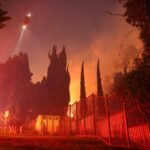

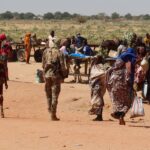
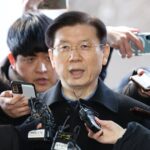
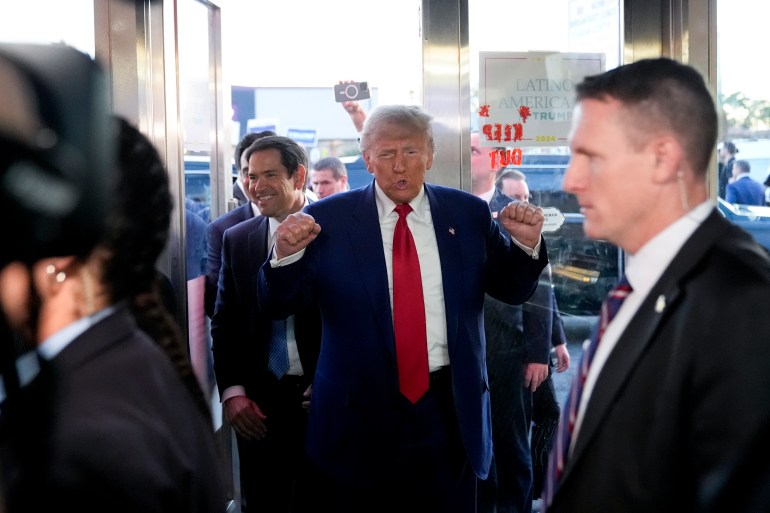

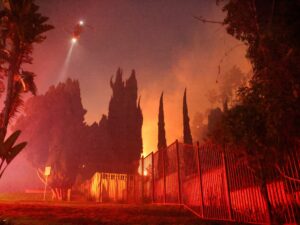

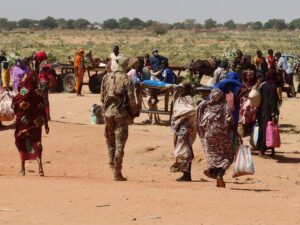
More Stories
Israeli settlers commit arson and vandalism in spate of West Bank attacks
Which Hollywood stars have lost their homes in the California wildfires?
Deaths from Israeli attacks in Gaza undercounted by 41 percent, study finds